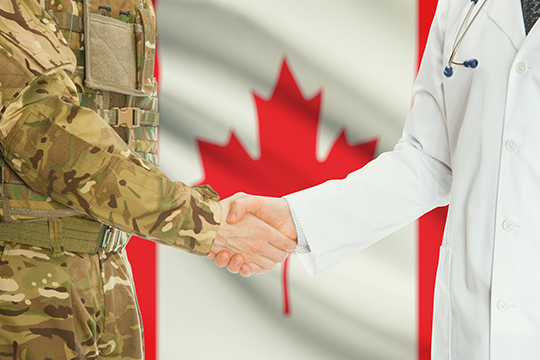
A new program aims to help health-care practitioners with the unique physical and mental health challenges faced by veterans. Veterans and their families can consult it, too.
There’s a new tool to help veterans navigating the health-care system — the My Patient is a Veteran Program. It’s a series of videos that are also podcasts, designed for health-care providers to understand the specific needs of veterans.
Veterans are a unique group in that their careers took place in a culture that promoted never showing weakness, says Jeffrey Puncher, administrative director of family medicine at the University of Ottawa.
“They could have a lot of underlying trauma that a civilian doctor or civilian emergency department might not be equipped to deal with on an emergency basis,” Puncher says.
Incomplete health records, an internal health system blind to sex- and gender-based differences and service-related injuries and illnesses that show up after release add to the complexity of veteran health care during and after release from the military.
With the scarcity of health care in general these days, many veterans, like many Canadians, don’t have a family doctor, or may have difficulty finding one given the unique conditions and care needs they may have. The My Patient is a Veteran program hopes to inform health practitioners who have veterans and their families as patients, as well as those who treat them in on-demand facilities, that while veterans may have different physical and mental health challenges, that shouldn’t discourage doctors from taking them on as patients.
The project was jointly developed by uOttawa’s department of family medicine, Queen’s University and the City of Ottawa’s veterans task force. It was launched in October 2023.
The seven-part video series explores the foundations of veteran health and well-being, as well as engaging with this patient population.
“If you look in the last 10 to 15 years, there’s been a very big focus on mental health in the services,” Puncher says. “[But] 20 years ago, you didn’t bring this up, you hid it away and you suffered silently. Now there is not so much of a stigma.”
The series also contributes to improved and more equitable outcomes in veteran health care by considering the needs of women veterans, including in a standalone module for this group, which features Women Veteran Research and Engagement Network members Maj. (ret’d) Karen Breeck and professor Maya Eichler. The series notes that “sex-and gender-specific military hazards that have real-life impacts on servicewomen and women veterans are under-researched and underappreciated.”
“For a long time, people had assumed that a one-size-fits-all-approach to military and veteran research and care was adequate,” Eichler says. “But increasingly, as the military population becomes more diverse, we’re beginning to understand that approach isn’t working for everyone. Veterans are best served by recognizing them as individuals with various intersectionalities.”
Eichler notes the importance of trauma awareness and effective screening for women who are veterans. Krisi Adamo, a uOttawa health sciences professor, reviews scientific findings on the sex-based differences in musculoskeletal injuries and health conditions experienced by women veterans. The findings inform not only health care, but preventive measures including evidence-informed policy change.
While the program is designed for health-care professionals, veterans and their families can explore the material and share it with their health-care providers.
According to Veterans Affairs Canada (VAC), as of March 2020, there were an estimated 629,300 veterans in Canada, which translates to approximately one in 50 Canadians, aged 15 years or older. About 32,100 of those are war service veterans from the Second World War or Korean War. The remaining 597,200 served after Korea. VAC provides services to 187,101 veterans, including war service veterans, Canadian Armed Forces veterans, RCMP veterans and survivors.
The program is available online.

